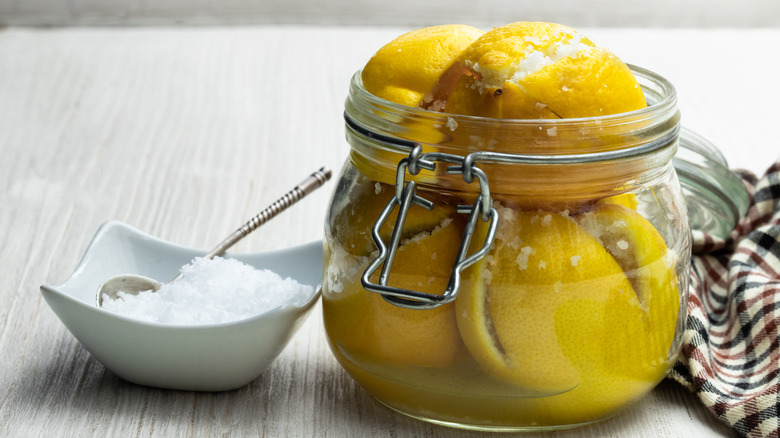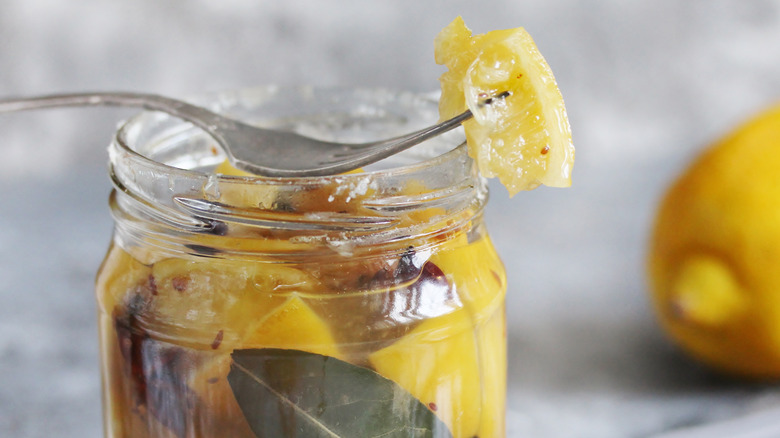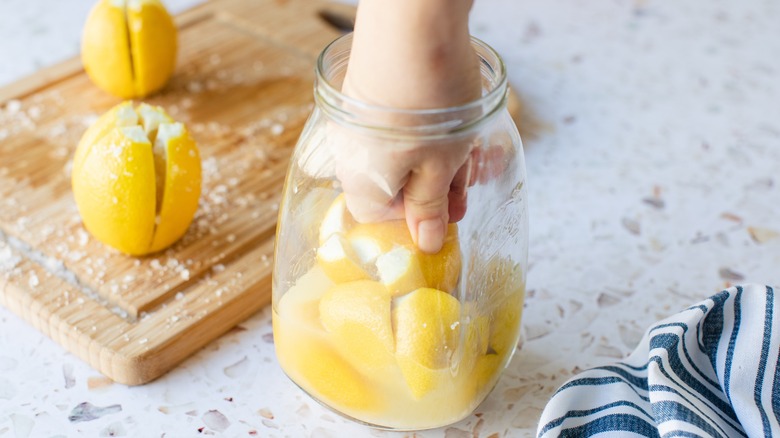Give Your Recipes Some Zest With Preserved Lemons
Lemons are one of a cook's greatest tools. From providing a hint of fresh acidity to dinner dishes to adding zest to a cocktail to being a secret ingredient in eco-friendly cleaning hacks, the lemon is truly an amazing multi-tasker. So, stop making these mistakes with lemons and take full advantage of these mighty yellow orbs.
Just adding lemon to your water can have a huge impact on your health, and your mood, according to Healthline. Squeezing a lemon into a glass of water can boost your immune system, iron absorption, and offer some disease prevention. The acidity decreases the chances of developing kidney stones, and its pectin is an ideal way to help beneficial gut bacteria thrive (per Well+Good). Even the mere scent of lemon's essential oil is enough to alleviate stress.
There is one way a lemon can be prepared, and preserved, which gives it some unfound complexity. If you know, you know. If not, it's high time you familiarize yourself with preserved lemons.
Preserved lemons take a common recipes to new heights
MasterClass explains how fermented lemons are such an important ingredient in some world cuisines across India, the Middle East, and Northern Africa. Preserved lemons might be best known as a seasoning in slow-cooked Moroccan tagine recipes. Its naturally fermented funkiness plays well with many flavors.
Traditionally, preserved lemons are just covered in salt and allowed to pickle. Once preserved, you can use the entire fruit, not just the flesh or outer zest. Most of the sweetness is gone and what remains is a good dose of umami, extreme saltiness, and plenty of sourness.
Diced preserved lemons enhance many dishes. Often it's too bold of a flavor to add to a dish on its own, so, it's added to many types of condiments, like basil-preserved lemon pesto. It's also used to brighten an olive tapenade, salsa verde, or bloody Mary — really, anywhere that lemon is welcome.
If used on their own, preserved lemons need to be minced as finely as possible. In this way, it's similar to lemon zest as a tasty garnish. A little goes a long way to enhance some hummus or a new take on guacamole. Just be sure to adjust the salt to compensate for all of the salt that comes with preserved lemons.
Preserved lemon are a worthy ingredient
Jars of preserved lemons are actually pretty common to find. Many supermarkets carry them, but if you can't find them at the local market, Amazon can get a jar to your mailbox. It also pays to scan your neighborhood for a Middle Eastern or Arabic grocer. They usually have preserved lemons and those aisles of potentially unfamiliar ingredients can be an inspiring trip for adventurous cooks.
You can also make them yourself. The New York Times explains the simple process of preserving lemons. All you need are lemons, kosher salt, peppercorns, bay leaves, a jar with a tight-fitting lid, and some time. Make two cuts almost all the way through the lemon. It'll be four lemon quarters held together on one end. Scrub every surface with ample kosher salt, and cram these into the jar with the other ingredients. Add the lid, shake the jar daily, and place it in a cool, dark area. In three to four weeks, the lemons will be tender and ready to go. At this point, store them in the fridge.
MasterClass recommends adding other flavors, aside from peppercorns, and bay leaves, for a more modern take. Cinnamon, coriander seeds, or dried chiles are all good candidates, too


